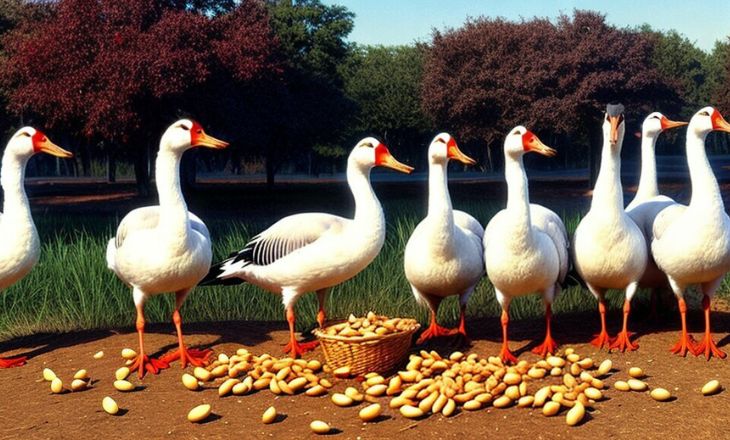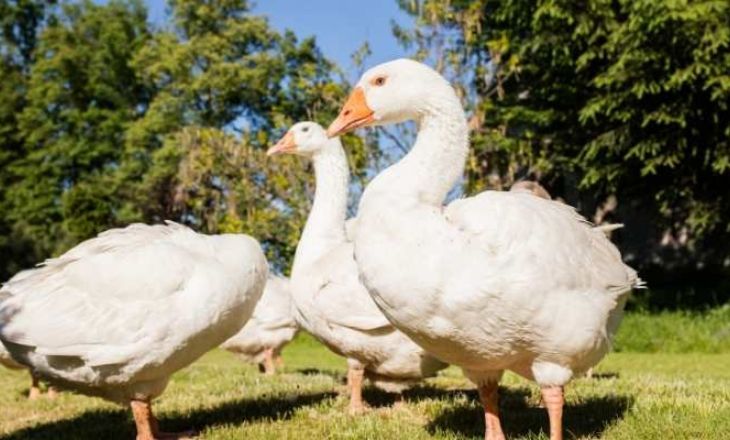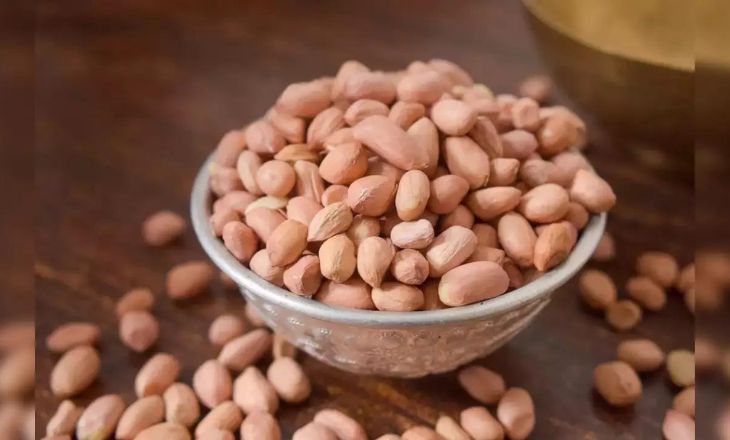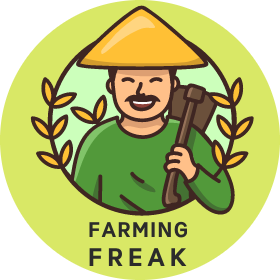As the chilly winter winds blow and the holiday season approaches, there’s nothing like snuggling up with a handful of warm peanuts or crunchy dry fruits. Not only do these treats provide a comforting burst of flavor, but they also offer a myriad of health benefits to keep us going through the cold months.
The question arises: can geese eat peanuts? This ponderance opens up a world of curiosity and concern for those who care for these majestic birds, prompting us to delve deeper into their dietary needs and safety precautions when indulging in our favorite winter snack.
We explore the fascinating world of feeding peanuts to geese and unravel the mysteries surrounding this age-old query.
Can Geese Eat Peanuts?
Peanuts are a great source of protein for geese, which is essential for their muscle development and overall health. The high-fat content in peanuts can also provide geese with an extra energy boost during the colder winter months when resources may be limited.

Feeding geese peanuts can also be an enjoyable way to bond with these beautiful birds. By offering them this treat in small amounts, you can create a positive interaction that benefits both yourself and the geese.
Just remember to always provide fresh water and other nutrient-rich foods alongside the peanuts to ensure your feathered friends are getting a well-rounded diet.
Is It Safe For Geese To Eat Peanuts?
When feeding peanuts to geese, it’s crucial to ensure that they are plain and unsalted. Seasoned or flavored peanuts may contain ingredients like garlic or onion powder, which can be harmful to geese. Moderation is key when offering peanuts as a treat to geese, as too many can lead to digestive issues.
Peanuts can be a valuable addition to a goose’s diet in moderation due to their high protein content. It’s essential not to rely solely on peanuts as the primary food source for geese, as they require a varied diet for optimal health.
When offered responsibly and in appropriate quantities, peanuts can be safe and enjoyable treats for geese without any negative health impacts.
Types of Peanuts NOT Safe For Geese
While peanuts can be a tasty snack for humans, not all types are safe for our feathered friends. Raw peanuts, in particular, should be avoided when feeding geese as they can hinder protein absorption.
Salted peanuts, even lightly salted ones, are detrimental to the health of geese due to their high sodium content. It’s important to prioritize the well-being of these birds by being mindful of what we offer them as treats.
By making informed decisions about the types of peanuts we offer to geese, we contribute to their overall health and well-being while creating a positive interaction with these beautiful birds in our environment.
Peanut Types Safe For Geese
Roasted and unsalted peanuts are a safe and nutritious choice for feeding geese. Opting for these varieties ensures that the geese receive a healthy snack without the harmful effects of excess salt or oil.
By offering a homemade peanut paste that contains only peanuts or a mix with other nuts, you provide your feathered companions with a wholesome treat that is free from additives.
Geese enjoy the rich texture and taste of peanuts, making them an ideal option for rewarding their playful antics. Homemade peanut paste allows you to control the ingredients, ensuring that your geese receive a natural and unprocessed snack full of essential nutrients.
Nutritional Benefits of Peanuts
Benefits of Peanuts for Pets Every pet parent aims to provide their furry friends with nutritious treats. Rest assured, peanuts offer a range of health advantages for pets.
- Protein: Peanuts are a rich source of protein, with over 22% of their calories derived from this essential nutrient. Geese rely on amino acids to support muscle repair and the development of strong feathers. Inadequate protein intake in geese can result in muscle atrophy, hindered growth, and decreased egg production.
- Niacin: Niacin, also known as Vitamin B3, plays a crucial role in maintaining the health of the digestive system and skin. Inadequate levels of niacin can lead to symptoms such as reduced appetite, overall fatigue, and diarrhea.
- Potassium: Potassium-rich peanuts play a crucial role in supporting health by promoting metabolism, muscle function, nerve activity, and overall well-being. Consider offering grapes to geese as a substitute for this essential nutrient.
- Magnesium: Geese benefit from the inclusion of magnesium in their diet to improve feed digestibility. Adequate magnesium intake supports the health of the brain, nerves, digestion, and reproduction. Consider offering sunflower seeds as a nutritious alternative feed option for geese.
- Fiber: Peanuts contain a significant amount of fiber, which accounts for more than one-third of their carbohydrate content and supports gut and digestive health.
Can Geese Eat Peanut Shells?
Despite the temptation to feed leftover peanut shells to geese, it’s essential to consider the potential risks involved. While peanuts themselves can provide some nutritional benefits, the shells are quite different.
Lacking essential nutrients and mostly consisting of dietary fiber, feeding whole peanut shells to geese can interfere with their digestion process.

The size and shape of peanut shells make them a choking hazard for geese. Their relatively hard texture can pose a serious risk to these birds if consumed in large quantities or without proper preparation.
If you still want to offer your feathered friends a small treat, consider grinding up a minimal amount of peanut shells before providing them as an occasional snack. It’s always important to prioritize the safety and well-being of these animals in any feeding practices we adopt.
Preparing Peanuts For Geese
- It is advisable to finely chop peanuts before feeding them to geese, as whole peanuts may cause blockages in the goose’s crop.
- Limit the daily peanut consumption to a maximum of two peanuts.
- Offer them as a light snack, rather than a full meal.
Risks of Feeding Peanuts
Feeding peanuts to geese may seem like a harmless practice, but there are risks involved that many people may not be aware of. A main concerns is the potential choking hazard that whole peanuts pose for geese.
Due to their hard shell and size, geese may struggle to swallow them properly, leading to blockages in their throats or digestive systems.

Peanuts can also be high in salt content, which can be harmful to the health of geese if consumed in large quantities. Excessive salt intake can lead to dehydration and other health issues in these birds.
It’s important for individuals feeding geese to consider these risks and opt for safer alternatives such as bird seeds or cracked corn. By being mindful of what we feed geese, we can help protect their well-being and ensure they stay healthy in their natural habitats.
Conclusion
While geese can technically eat peanuts, it is not the healthiest option for them due to their high-fat content and potential risk of choking. It is important to provide geese with a balanced diet that includes grains, seeds, and leafy greens to ensure their overall health and well-being.
Feeding geese in moderation is key to preventing overconsumption of foods that may not be suitable for them. If you are unsure about what foods are safe for geese to eat, consult with a veterinarian or wildlife expert for guidance.
Remember, prioritizing the health and safety of these animals should always be our top priority.
FAQs:
Are Peanuts Good For Birds?
Peanuts can be a good source of protein and healthy fats for certain bird species, such as woodpeckers, jays, and chickadees. However, it is important to offer peanuts in moderation and ensure they are unsalted and unseasoned. Salted or flavored peanuts can be harmful to birds as their bodies cannot process excess salt well.
What Makes Geese Happy?
Geese are outdoor creatures that enjoy spending time in natural settings such as ponds, lakes, and grassy areas. Access to clean water for swimming, ample space for grazing, and a safe environment free from predators are important factors in keeping geese content. creating a suitable habitat that meets the social and environmental needs of geese is key to ensuring their happiness.
Can Geese And Goose Eat Peanuts?
Geese and goose can eat peanuts in moderation as a treat, but they should not be a staple of their diet. Peanuts are high in fat and protein, which can be beneficial for waterfowl like geese as part of a balanced diet. Too many peanuts can lead to obesity and other health issues.
- Can Cows Eat Oranges? Precautions and Benefits - May 27, 2024
- Can Rabbits Eat Rosemary? CareTips, Risks and Benefits - May 23, 2024
- Can Pekin Ducks Fly? Interesting Facts about Flight - May 19, 2024

